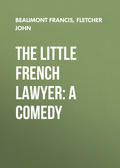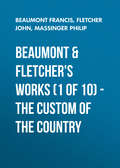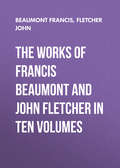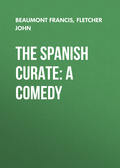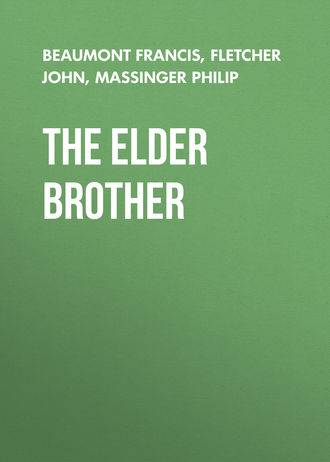
Beaumont Francis
The Elder Brother
ACTUS III. SCENA III
Enter Charles.
Char. What a noise is in this house? my head is broken, within a Parenthesis, in every corner, as if the Earth were shaken with some strange Collect, there are stirs and motions. What Planet rules this house?
Enter Andrew.
Who's there?
And. 'Tis I, Sir, faithful Andrew.
Char. Come near, and lay thine ear down; hear'st no noise?
And. The Cooks are chopping herbs and mince-meat to make Pies, and breaking Marrow-bones—
Char. Can they set them again?
And. Yes, yes, in Broths and Puddings, and they grow stronger for the use of any man.
Char. What speaking's that? sure there's a Massacre.
And. Of Pigs and Geese, Sir, and Turkeys, for the spit. The Cooks are angry Sirs, and that makes up the medley.
Char. Do they thus at every Dinner? I ne're mark'd them yet, nor know who is a Cook.
And. They're sometimes sober, and then they beat as gently as a Tabor.
Char. What loads are these?
And. Meat, meat, Sir, for the Kitchen, and stinking Fowls the Tenants have sent in; they'll ne'r be found out at a general eating; and there's fat Venison, Sir.
Char. What's that?
And. Why Deer, those that men fatten for their private pleasures, and let their Tenants starve upon the Commons.
Char. I've read of Deer, but yet I ne'er eat any.
And. There's a Fishmongers Boy with Caviar, Sir, Anchoves, and Potargo, to make ye drink.
Char. Sure these are modern, very modern meats, for I understand 'em not.
And. No more does any man from Caca merda, or a substance worse, till they be greas'd with Oyl, and rubb'd with Onions, and then flung out of doors, they are rare Sallads.
Char. And why is all this, prethee tell me, Andrew? are there any Princes to dine here to day? by this abundance sure there should be Princes; I've read of entertainment for the gods at half this charge; will not six Dishes serve 'em? I never had but one, and that a small one.
_And._Your Brother's marri'd this day; he's marri'd your younger Brother Eustace.
Char. What of that?
And. And all the Friends about are bidden hither; there's not a Dog that knows the house, but comes too.
Char. Marri'd! to whom?
And. Why to a dainty Gentlewoman, young, sweet, and modest.
Char. Are there modest women? how do they look?
And. O you'll bless yourself to see them. He parts with's Books, he ne'er did so before yet.
Char. What does my Father for 'em?
And. Gives all his Land, and makes your Brother heir.
Char. Must I have nothing?
And. Yes, you must study still, and he'll maintain you.
Char. I am his eldest Brother.
And. True, you were so; but he has leap'd o'er your shoulders, Sir.
Char. 'Tis well; he'll not inherit my understanding too?
And. I think not; he'll scarce find Tenants to let it out to.
Char. Hark! hark!
And. The Coach that brings the fair Lady.
Enter Lewis, Angellina, Ladies, Notary, &c.
And. Now you may see her.
Char. Sure this should be modest, but I do not truly know what women make of it, Andrew; she has a face looks like a story, the story of the Heavens looks very like her.
And. She has a wide face then.
Char. She has a Cherubin's, cover'd and vail'd with modest blushes. Eustace, be happy, whiles poor Charles is patient. Get me my Books again, and come in with me— [Exeunt.
Enter Brisac, Eustace, Egremont, Cowsy, Miramont.
Bri. Welcome, sweet Daughter; welcome, noble Brother; and you are welcome, Sir, with all your Writings; Ladys, most welcome: What, my angry Brother! you must be welcome too, the Feast is flat else.
Mir. I am not come for your welcome, I expect none; I bring no joys to bless the bed withall; nor Songs, nor Masques to glorifie the Nuptials; I bring an angry mind to see your folly, a sharp one too, to reprehend you for it.
Bri. You'll stay and dine though.
Mir. All your meat smells musty, your Table will shew nothing to content me.
Bri. I'le answer you here's good meat.
Mir. But your sauce is scurvie, it is not season'd with the sharpness of discretion.
Eust. It seems your anger is at me, dear Uncle.
Mir. Thou art not worth my anger, th'art a Boy, a lump o'thy Father's lightness, made of nothing but antick cloathes and cringes; look in thy head, and 'twill appear a foot-ball full of fumes and rotten smoke. Lady, I pity you; you are a handsome and a sweet young Lady, and ought to have a handsom man yok'd t'ye, an understanding too; this is a Gimcrack, that can get nothing but new fashions on you; for say he have a thing shap'd like a child, 'twill either prove a Tumbler or a Tailor.
Eust. These are but harsh words, Uncle.
Mir. So I mean 'em. Sir, you play harsher play w'your elder Brother.
Eust. I would be loth to give you.
Mir. Do not venture, I'le make your wedding cloaths sit closer t'ye then; I but disturb you, I'le go see my Nephew.
Lew. Pray take a piece of Rosemary.
Mir. I'le wear it, but for the Ladys sake, and none of yours; may be I'le see your Table too.
Bri. Pray do, Sir.
Ang. A mad old Gentleman.
Bri. Yes faith, sweet Daughter, he has been thus his whole age, to my knowledge; he has made Charles his Heir, I know that certainly; then why should he grudge Eustace any thing?
Ang. I would not have a light head, nor one laden with too much learning, as, they say, this Charles is, that makes his Book his Mistris; Sure there's something hid in this old man's anger, that declares him not a meer sot.
Bri. Come, shall we go and seal, Brother? all things are ready, and the Priest is here. When Charles has set his hand unto the Writings, as he shall instantly, then to the Wedding, and so to dinner.
Lew. Come, let's seal the Book first for my Daughters Jointure.
Bri. Let's be private in't, Sir. [Exeunt.
ACTUS III. SCENA IV
Enter Charles, Miramont, Andrew.
Mir. Nay, y'are undone.
Char. Hum.
Mir. Ha'ye no greater feeling?
And. You were sensible of the great Book, Sir, when it fell on your head, and now the house is ready to fall, do you fear nothing?
Char. Will he have my Books too.
Mir. No, he has a Book, a fair one too, to read on, and read wonders; I would thou hadst her in thy Study, Nephew, and 'twere but to new string her.
Char. Yes, I saw her, and me thought 'twas a curious piece of Learning, handsomely bound, and of a dainty Letter.
And. He flung away his Book.
Mir. I like that in him; would he had flung away his dulness too, and spoke to her.
Char. And must my Brother have all?
Mir. All that your Father has.
Char. And that fair woman too?
Mir. That woman also.
Char. He has enough then. May I not see her sometimes, and call her sister? I will do him no wrong.
Mir. This makes me mad, I could now cry for anger: these old Fools are the most stubborn and the wilfullest Coxcombs; Farewell, and fall to your Book, forget your Brother: you are my Heir, and I'le provide y'a Wife: I'le look upon this marriage, though I hate it. [Exit.
Enter Brisac.
Bri. Where is my Son?
And. There, Sir, casting a Figure what chopping children his Brother shall have.
Bri. He does well. How do'st, Charles? still at thy Book?
And. He's studying now, Sir, who shall be his Father.
Bri. Peace, you rude Knave—Come hither, Charles, be merry.
Char. I thank you, I am busie at my Book, Sir.
Bri. You must put your hand, my Charles, as I would have you, unto a little piece of Parchment here: only your name; you write a reasonable hand.
Char. But I may do unreasonably to write it. What is it, Sir?
Bri. To pass the Land I have, Sir, unto your younger Brother.
Char. Is't no more?
Bri. No, no, 'tis nothing: you shall be provided for, and new Books you shall have still, and new Studies, and have your means brought in without thy care, Boy, and one still to attend you.
Char. This shews your love, Father.
Bri. I'm tender to you.
And. Like a stone, I take it.
Char. Why Father, I'll go down, an't please you let me, because I'd see the thing they call the Gentlewoman; I see no Woman but through contemplation, and there I'll do't before the company, and wish my Brother fortune.
Bri. Do, I prethee.
Char. I must not stay, for I have things above require my study.
Bri. No, thou shalt not stay; thou shalt have a brave dinner too.
And. Now has he o'erthrown himself for ever; I will down into the Cellar, and be stark drunk for anger. [Exeunt.
ACTUS III. SCENA V
Enter Lewis, Angellina, Eustace, Priest, Ladies, Cowsy, Notary, and Miramont.
Not. Come, let him bring his Sons hand, and all's done. Is your's ready?
Pri. Yes, I'll dispatch ye presently, immediately, for in truth I am a hungry.
Eust. Do, speak apace, for we believe exactly: do not we stay long, Mistress?
Ang. I find no fault, better things well done, than want time to do them. Uncle, why are you sad?
Mir. Sweet smelling blossom, would I were thine Uncle to thine own content, I'd make thy Husband's state a thousand better, a yearly thousand. Thou hast mist a man, (but that he is addicted to his study, and knows no other Mistress than his mind) would weigh down bundles of these empty kexes.
Ang. Can he speak, Sir?
Mir. Faith yes, but not to Women; his language is to Heaven, and heavenly wonder; to Nature, and her dark and secret causes.
Ang. And does he speak well there?
Mir. O admirably! but he's too bashful to behold a Woman, there's none that sees him, and he troubles none.
Ang. He is a man.
Mir. Faith yes, and a clear sweet spirit.
Ang. Then conversation me thinks—
Mir. So think I; but it is his rugged Fate, and so I leave you.
Ang. I like thy nobleness.
Eust. See my mad Uncle is courting my fair Mistress.
Lew. Let him alone; there's nothing that allays an angry mind so soon as a sweet Beauty: he'll come to us.
Enter Brisac, and Charles.
Eust. My Father's here, my Brother too! that's a wonder, broke like a Spirit from his Cell.
Bri. Come hither, come nearer, Charles; 'twas your desire to see my noble Daughter, and the company, and give your Brother joy, and then to Seal, Boy; you do, like a good Brother.
Lew. Marry does he, and he shall have my love for ever for't. Put to your hand now.
Not. Here's the Deed, Sir, ready.
Char. No, you must pardon me a while, I tell ye, I am in contemplation, do not trouble me.
Bri. Come, leave thy Study, Charles.
Char. I'll leave my life first; I study now to be a man, I've found it. Before what Man was, was but my Argument.
Mir. I like this best of all, he has taken fire, his dull mist flies away.
Eust. Will you write, Brother?
Char. No, Brother, no; I have no time for poor things, I'm taking the height of that bright Constellation.
Bri. I say you trifle time, Son.
Char. I will not seal, Sir; I am your Eldest, and I'll keep my Birth-right, for Heaven forbid I should become example: Had y'only shew'd me Land, I had deliver'd it, and been a proud man to have parted with it; 'tis dirt, and labour. Do I speak right, Uncle?
Mir. Bravely, my Boy, and bless thy tongue.
Char. I'll forward: but you have open'd to me such a treasure, I find my mind free; Heaven direct my fortune.
Mir. Can he speak now? Is this a son to sacrifice?
Char. Such an inimitable piece of Beauty, that I have studied long, and now found only, that I'll part sooner with my soul of Reason, and be a Plant, a Beast, a Fish, a Flie, and only make the number of things up, than yield to one foot of Land, if she be ti'd to't.
Lew. He speaks unhappily.
Ang. And methinks bravely. This the meer Scholar?
Eust. You but vex your self, Brother, and vex your study too.
Char. Go you and study, for 'tis time, young Eustace; you want both man and manners; I've study'd both, although I made no shew on't. Go turn the Volumes over I have read, eat and digest them, that they may grow in thee; wear out the tedious night with thy dim Lamp, and sooner lose the day, than leave a doubt. Distil the sweetness from the Poets Spring, and learn to love; thou know'st not what fair is: Traverse the stories of the great Heroes, the wise and civil lives of good men walk through; thou hast seen nothing but the face of Countrys, and brought home nothing but their empty words: why shouldst thou wear a Jewel of this worth, that hast no worth within thee to preserve her?
_Beauty clear and fair,
Where the Air
Rather like a perfume dwells,
Where the Violet and the Rose
The blew Veins in blush disclose,
And come to honour nothing else.
Where to live near,
And planted there,
Is to live, and still live new;
Where to gain a favour is
More than light, perpetual bliss,
Make me live by serving you.
Dear again back recall
To this light,
A stranger to himself and all;
Both the wonder and the story
Shall be yours, and eke the glory;
I am your servant and your thrall._
Mir. Speak such another Ode, and take all yet. What say ye to the Scholar now?
Ang. I wonder; is he your Brother, Sir?
Eust. Yes, would he were buried; I fear he'll make an Ass of me a younger.
Ang. Speak not so softly, Sir, 'tis very likely.
Bri. Come, leave your finical talk, and let's dispatch, Charles.
Char. Dispatch, what?
Bri. Why the Land.
Char. You are deceiv'd, Sir. Now I perceive what 'tis that wooes a woman, and what maintains her when she's woo'd: I'll stop here. A wilful poverty ne'er made a Beauty, nor want of means maintain'd it vertuously: though land and moneys be no happiness, yet they are counted good additions. That use I'll make; he that neglects a blessing, though he want a present knowledge how to use it, neglects himself. May be I have done you wrong, Lady, whose love and hope went hand in hand together; may be my Brother, that has long expected the happy hour, and bless'd my ignorance; pray give me leave, Sir, I shall clear all doubts; why did they shew me you? pray tell me that?
(Mir. He'll talk thee into a pension for thy knavery.)
Char. You, happy you, why did you break unto me? The Rosie sugred morn ne'er broke so sweetly: I am a man, and have desires within me, affections too, though they were drown'd a while, and lay dead, till the Spring of beauty rais'd them; till I saw those eyes, I was but a lump, a chaos of confusedness dwelt in me; then from those eyes shot Love, and he distinguish'd, and into form he drew my faculties; and now I know my Land, and now I love too.
Bri. We had best remove the Maid.
Char. It is too late, Sir. I have her figure here. Nay frown not, Eustace, there are less worthy Souls for younger Brothers; this is no form of Silk, but Sanctity, which wild lascivious hearts can never dignifie. Remove her where you will, I walk along still, for, like the light, we make no separation; you may sooner part the Billows of the Sea and put a barr betwixt their fellowships, than blot out my remembrance; sooner shut old Time into a Den, and stay his motion, wash off the swift hours from his downy wings, or steal Eternity to stop his glass, than shut the sweet Idea I have in me. Room for an Elder Brother, pray give place, Sir.
Mir. H'as studied duel too; take heed, he'll beat thee. H'as frighted the old Justice into a Feaver; I hope he'll disinherit him too for an Ass; for though he be grave with years, he's a great Baby.
Char. Do not you think me mad?
Ang. No certain, Sir, I have heard nothing from you but things excellent.
Char. You look upon my cloaths, and laugh at me, my scurvy cloaths!
Ang. They have rich linings, Sir. I would your Brother—
Char. His are gold and gawdie.
Ang. But touch 'em inwardly, they smell of Copper.
Char. Can ye love me? I am an Heir, sweet Lady, however I appear a poor dependent; love you with honour I shall love so ever. Is your eye ambitious? I may be a great man; is't wealth or lands you covet? my Father must die.
Mir. That was well put in, I hope he'll take it deeply.
Char. Old men are not immortal, as I take it; is it you look for, youth and handsomness? I do confess my Brother's a handsome Gentleman, but he shall give me leave to lead the way, Lady. Can you love for love, and make that the reward? The old man shall not love his heaps of Gold with a more doting superstition, than I'le love you. The young man his delights, the Merchant, when he ploughs the angry Sea up and sees the mountain billows falling on him, as if all the Elements, and all their angers, were turn'd into one vow'd destruction; shall not with greater joy embrace his safety. We'll live together like two wanton Vines, circling our souls and loves in one another, we'll spring together, and we'll bear one fruit; one joy shall make us smile, and one grief mourn; one age go with us, and one hour of death shall shut our eyes, and one grave make us happy.
Ang. And one hand seal the Match, I'm yours for ever.
Lew. Nay, stay, stay, stay.
Ang. Nay certainly, 'tis done, Sir.
Bri. There was a contract.
Ang. Only conditional, that if he had the Land, he had my love too; this Gentleman's the Heir, and he'll maintain it. Pray be not angry, Sir, at what I say; or if you be, 'tis at your own adventure. You have the out- side of a pretty Gentleman, but by my troth your inside is but barren; 'tis not a face I only am in love with, nor will I say your face is excellent, a reasonable hunting face to court the wind with; nor they're not words, unless they be well plac'd too, nor your sweet Dam-mes, nor your hired Verses, nor telling me of Clothes, nor Coach and Horses, no nor your visits each day in new Suits, nor your black Patches you wear variously, some cut like Stars, some in Half-moons, some Lozenges, (all which but shew you still a younger Brother.)
Mir. Gramercy, Wench, thou hast a noble Soul too.
Ang. Nor your long travels, nor your little knowledge, can make me doat upon you. Faith go study, and glean some goodness, that you may shew manly; your Brother at my suit I'm sure will teach you; or only study how to get a Wife, Sir. Y'are cast far behind, 'tis good you should be melancholy, it shews like a Gamester that had lost his mony; and 'tis the fashion to wear your arm in a skarf, Sir, for [you] have had a shrewd cut o'er the fingers.
Lew. But are y'in earnest?
Ang. Yes, believe me, Father, you shall ne'er choose for me; y'are old and dim, Sir, and th' shadow of the earth Eclips'd your judgment. Y'have had your time without control, dear Father, and you must give me leave to take mine now, Sir.
Bri. This is the last time of asking, will you set your hand to?
Cha. This is the last time of answering, I will never.
Bri. Out of my doors.
Char. Most willingly.
Mir. He shall, Jew, thou of the Tribe of Man-y-asses, Coxcomb, and never trouble thee more till thy chops be cold, fool.
Ang. Must I be gone too?
Lew. I will never know thee.
Ang. Then this man will; what Fortune he shall run, Father, be't good or bad, I must partake it with him.
Enter Egremont.
Egre. When shall the Masque begin?
Eust. 'Tis done already; all, all is broken off, I am undone, Friend, my Brother's wise again, and has spoil'd all, will not release the Land, has won the Wench too.
Egre. Could he not stay till the Masque was past? w'are ready. What a scurvy trick's this?
Mir. O you may vanish, perform it at some Hall, where the Citizens Wives may see't for Six-pence a piece, and a cold Supper. Come, let's go, Charles. And now, my noble Daughter, I'le sell the Tiles of my House, e're thou shalt want, Wench. Rate up your Dinner, Sir, and sell it cheap: some younger Brother will take't up in Commodities. Send you joy, Nephew Eustace; if you study the Law, keep your great Pippin-pies, they'll go far with ye.
Char. I'd have your blessing.
Bri. No, no, meet me no more. Farewel, thou wilt blast mine eyes else.
Char. I will not.
Lew. Nor send not you for Gowns.
Ang. I'll wear course Flannel first.
Bri. Come, let's go take some counsel.
Lew. 'Tis too late.
Bri. Then stay and dine; it may be we shall vex 'em. [Exeunt.
ACTUS QUARTUS. SCENA PRIMA
Enter Brisac, Eustace, Egremont, Cowsy.
Brisac. Ne'er talk to me, you are no men but Masquers; shapes, shadows, and the signs of men, Court bubbles, that every breath or breaks or blows away. You have no souls, no metal in your bloods, no heat to stir ye when ye have occasion: frozen dull things, that must be turn'd with Leavers. Are you the Courtiers, and the travell'd Gallants? the spritely Fellows that the people talk of? Ye have no more spirit than three sleepy sopes.
Eust. What would ye have me do, Sir?
Bri. Follow your Brother, and get ye out of doors, and seek your Fortune. Stand still becalm'd, and let an aged Dotard, a hair-brain'd Puppy, and a Bookish Boy, that never knew a Blade above a Pen-knife, and how to cut his meat in Characters, cross my design, and take thine own Wench from thee, in mine own house too? Thou despis'd poor fellow!
Eust. The reverence that I ever bare to you, Sir, then to my Uncle, with whom 't had been but sawciness t' have been so rough—
Egre. And we not seeing him strive in his own cause, that was principal, and should have led us on, thought it ill manners to begin a quarrel here.
Bri. You dare do nothing. Do you make your care the excuse of your Cowardise? Three Boys on Hobby-horses, with three penny Halberds, would beat you all.
Cow. You must not say so.
Bri. Yes, and sing it too.
Cow. You are a man of peace, therefore we must give way.
Bri. I'll make my way, and therefore quickly leave me, or I'll force you; and having first torn off your flanting feathers, I'll trample on 'em; and if that cannot teach you to quit my house, I'll kick ye out of my gates; you gawdy Glow-worms, carrying seeming fire, yet have no heat within ye.
Cow. O blest travel! how much we owe thee for our power to suffer!
Egre. Some splenetive Youths now, that had never seen more than thy Country smoak, will grow in choler; it would shew fine in us.
Eust. Yes marry would it, that are prime Courtiers, and must know no angers, but give thanks for our injuries, if we purpose to hold our places.
Bri. Will you find the door? and find it suddenly? you shall lead the way, Sir, with your perfum'd retinue, and recover the now lost Angellina, or build on it, I will adopt some beggar's doubtful issue, before thou shalt inherit.
Eust. We'll to counsel, and what may be done by man's wit or valour, we'll put in Execution.
Bri. Do, or never hope I shall know thee. [Exeunt.
_Enter _Lewis.
Lew. O Sir, have I found you?
Bri. I never hid my self; whence flows this fury, with which, as it appears, you come to fright me?
Lew. I smell a plot, meer conspiracy amongst ye all to defeat me of my Daughter; and if she be not suddenly deliver'd, untainted in her reputation too, the best of France shall know how I am jugled with. She is my Heir, and if she may be ravish'd thus from my care, farewel Nobility; Honour and Blood are meer neglected nothings.
Bri. Nay then, my Lord, you go too far, and tax him, whose innocency understands not what fear is. If your unconstant Daughter will not dwell on certainties, must you thenceforth conclude that I am fickle? what have I omitted, to make good my integrity and truth? nor can her lightness, nor your supposition, cast an aspersion on me.
Lew. I am wounded in fact, nor can words cure it: do not trifle, but speedily, once more I do repeat it, restore my Daughter as I brought her hither, or you shall hear from me in such a kind, as you will blush to answer.
Bri. All the world, I think, conspires to vex me, yet I will not torment my self: some sprightful mirth must banish the rage and melancholy which hath almost choak'd me; t' a knowing man 'tis Physick, and 'tis thought on; one merry hour I'll have in spight of Fortune, to chear my heart, and this is that appointed; this night I'll hug my Lilly in mine arms, provocatives are sent before to chear me, we old men need 'em, and though we pay dear for our stoln pleasures, so it be done securely, the charge much like a sharp sauce, gives 'em relish. Well, honest Andrew, I gave you a Farm, and it shall have a Beacon, to give warning to my other Tenants when the Foe approaches; and presently, you being bestowed else-where, I'le graff it with dexterity on your forehead; indeed I will, Lilly, I come, poor Andrew. [Exit.



